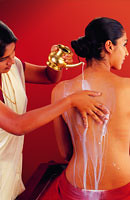Oil Bath with Coconut and Vetiver
Following the previous line of thought about vetiver and its healing properties, I decided to treat myself to an oil bath this evening. Unlike a "bath oil" this is actually bathing in oil, with no water at first. It is a special ritual you can do for yourself on a daily basis or as often as you wish. Paying attention to every part of your body and self-massaging with the oil to smooth out pains and strains and release tension can make all the difference in how you feel. Aside from nourishing your skin with the rich, nutritious oil, you will be taking care of each and every part of your body, making sure it gets positive attention.
Most of us avoid self-massaging and leave it either to the "professional" (which we usually see only when we are already in real trouble), or wait patiently for our significant other to come around and find the moment to treat us to one. This is where the biggest advantage of self-massaging lies: you can give it to yourself as often as you want and as long as you want!
Although there is the obvious disadvantage of not being able to reach all body parts in an equal ease and apply the same amount of pressure, you will still find self massaging to be quite special and beneficial because you know your body best and you know what places need more attention than others.
For the Oil Bath:
Simply fill a small bowl with three tablespoons of organic virgin coconut oil, (this evening, mine had the consistency of smooth icing). Coconut oil liquefies in warm temperatures and solidifies in cool temperatures. The only time I've seen it clear and mobile was when I heated it gently on the stove, but that's because I live in Vancouver; If you live in a warmer climate, your coconut oil might be completely liquid.
Add two drops of vetiver oil, either wild crafted or or organic. I used my wild Haitian vetiver, which is my favourite for its completely inoffensive qualities - it is sheer pleasure. In aromatherapy, I learned, more is less; I recommend not using more than three drops for this ritual of self-healing. The therapeutic qualities of the oil will be more effective when it is used in the smallest doses possible. High doses may be counter-productive, especially when applied on large areas of the skin.
Stand or sit in the bath, and scoop large dollops of the semi-solid oil with your fingers. If the oil is liquified, just dip your fingers in it as needed. Massage onto your body, starting with the head and the shoulders, smoothing out rough corners and focusing on areas that need attention. Move from head and shoulders downwards to your lower back and legs. Don't forget to apply oil and massage your arms as well - they will be working hard all this time. Once your entire body is oiled and lubricated, you can use a gentler touch, trying to push out gently any excessive stress that may still remain behind, directing it outwards of your body. You may also gently massage your face - forehead, cheeks, chin - with whatever oil is left on your fingers (you won't need to oil your face like the rest of the body...
When you are finished, fill the bath with warm water and relax. You may choose to either wash the coconut with soap, or you may leave it on your skin. You skin will remai soft and nourished, and with a gentle yet very noticeable scent of coconut and just the slightest hint of wood from the vetiver.




